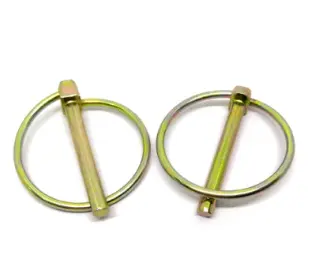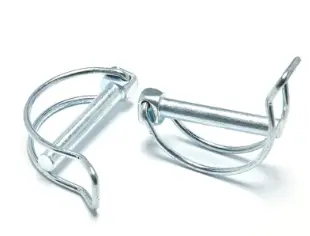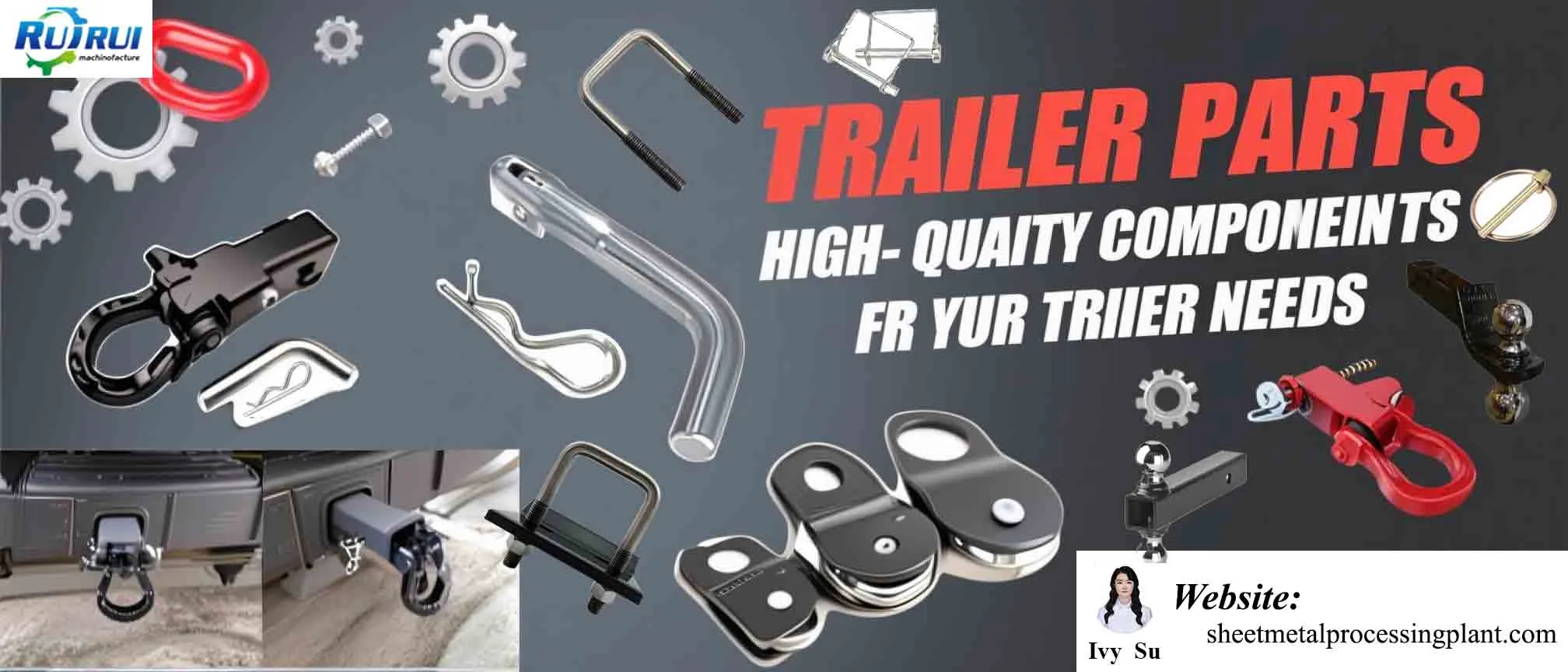Is a locking hitch pin worth it?
2025-09-25 15:06:34
Picture this scenario: You've just finished a long day of camping with your family, loaded up your expensive trailer with all your gear, and stopped at a restaurant for dinner. When you return to your vehicle, your trailer is gone. This nightmare situation happens to thousands of trailer owners every year, making the question "Is a locking hitch pin worth it?" more critical than ever. A locking hitch pin serves as your first line of defense against trailer theft while providing the secure connection necessary for safe towing operations, making it an essential investment for anyone serious about protecting their valuable towing equipment.

What Makes a Locking Hitch Pin Essential for Trailer Security?
-
Enhanced Theft Protection Mechanisms
The primary advantage of investing in a locking hitch pin lies in its ability to deter opportunistic thieves who target unattended trailers. Unlike standard hitch pins that can be removed in seconds with basic tools, a quality locking hitch pin creates a significant barrier that requires specialized equipment and considerable time to bypass. Professional-grade locking mechanisms incorporate hardened steel construction and anti-drill features that make unauthorized removal extremely difficult. Modern locking hitch pins utilize advanced locking systems with precision-machined components that resist picking, drilling, and cutting attempts. The psychological deterrent effect cannot be understated, as thieves typically move on to easier targets when faced with visible security measures.
-
Safety Benefits During Transportation
Beyond security, locking hitch pins provide crucial safety advantages during towing operations. The integrated locking mechanism ensures that the pin cannot accidentally work loose during transport, eliminating the risk of trailer disconnection that could result in catastrophic accidents. Traditional hitch pins secured only by a cotter pin or clip can fail due to road vibrations, improper installation, or component fatigue. A locking hitch pin eliminates these failure modes through its positive locking action that maintains constant engagement throughout the journey. This enhanced security becomes particularly critical when towing heavy loads at highway speeds, where trailer disconnection could endanger multiple vehicles.
-
Long-Term Cost Effectiveness Analysis
When evaluating whether a locking hitch pin is worth the investment, consider the replacement cost of a stolen trailer against the relatively modest price of quality security hardware. Even a basic travel trailer represents thousands of dollars in value, while specialized trailers for boats, equipment, or recreational vehicles can cost tens of thousands. A professional-grade locking hitch pin costs a fraction of potential losses while providing years of reliable service. Additionally, many insurance companies recognize the risk reduction provided by proper security measures and may offer premium discounts for trailers equipped with anti-theft devices.
Comparing Locking Hitch Pin Types and Materials
-
Steel Construction Advantages
High-strength steel construction forms the foundation of any reliable locking hitch pin, providing the durability necessary to withstand both normal use stresses and attempted tampering. Premium manufacturers utilize Q235B steel or similar high-tensile materials that offer excellent corrosion resistance while maintaining structural integrity under extreme conditions. The manufacturing process typically involves precision machining followed by heat treatment to achieve optimal hardness characteristics. Advanced surface treatments such as zinc coating or powder coating provide additional protection against environmental factors that could compromise long-term performance. These materials ensure that your locking hitch pin maintains its protective capabilities throughout years of regular use.
-
Locking Mechanism Design Variations
Modern locking hitch pins incorporate various mechanisms designed to balance security, convenience, and reliability. Key-operated systems remain popular due to their familiar operation and high security level, with many manufacturers offering keyed-alike options for fleet applications. Push-button mechanisms provide quick operation without requiring keys but may sacrifice some security for convenience. Combination locks eliminate the risk of lost keys while maintaining reasonable security levels for most applications. The most advanced systems incorporate dual-locking mechanisms that require both key operation and manual engagement to ensure maximum security. Professional users often prefer systems that integrate with their existing key systems to minimize the number of keys required.
-
Size and Compatibility Considerations
Proper sizing represents a critical factor in locking hitch pin selection, as incorrect dimensions can compromise both security and safety. Standard receiver hitches accommodate pins ranging from 5/8 inch to 3/4 inch diameter, with length requirements varying based on receiver design and tongue thickness. Heavy-duty applications may require larger diameter pins to handle increased load capacities safely. Compatibility extends beyond basic dimensions to include clearance requirements for the locking mechanism, as some designs require additional space for key operation or removal. Professional installation services can ensure proper fit and operation while identifying any modifications needed for optimal performance.

Professional Applications and Industry Standards
-
Commercial and Industrial Use Cases
Professional towing operations rely on locking hitch pins to protect valuable equipment and maintain operational continuity. Construction companies utilize these devices to secure expensive trailers carrying tools, materials, and machinery between job sites. Agricultural operations depend on locking hitch pins to protect specialized equipment trailers that represent significant capital investments. Fleet operators appreciate the standardization possible with keyed-alike systems that allow any authorized key to operate multiple locks throughout their operation. The liability protection provided by proper security measures also influences professional decision-making, as demonstrated security precautions can reduce legal exposure in theft situations.
-
Compliance with Safety Regulations
Many jurisdictions mandate specific security measures for commercial trailers, making locking hitch pins not just advisable but legally required. Transportation authorities recognize the public safety implications of unsecured trailers and have established regulations governing their protection. Professional drivers must demonstrate compliance with these regulations during inspections, making quality locking hitch pins essential equipment rather than optional accessories. Industry standards organizations publish guidelines for minimum security requirements that influence insurance coverage and legal liability. Staying current with evolving regulations requires working with suppliers who understand compliance requirements and can provide appropriate documentation.
-
Quality Certification and Testing Standards
Reputable manufacturers subject their locking hitch pins to rigorous testing protocols that verify performance under extreme conditions. Load testing ensures that the pin can handle maximum rated capacities without failure, while durability testing simulates years of use through accelerated wear procedures. Security testing evaluates resistance to common attack methods including drilling, cutting, and picking attempts. Environmental testing confirms proper operation under temperature extremes, moisture exposure, and corrosive conditions typical of real-world use. Third-party certification from recognized testing organizations provides independent verification of manufacturer claims and helps buyers make informed decisions.
Installation and Maintenance Best Practices
-
Proper Installation Techniques
Correct installation forms the foundation of effective locking hitch pin performance, requiring attention to detail and adherence to manufacturer specifications. Begin by ensuring that both the hitch receiver and trailer tongue are clean and free from debris that could interfere with proper engagement. Verify that the pin diameter matches the receiver hole precisely, as oversized pins can cause damage while undersized pins create dangerous play. Apply appropriate lubricants to moving parts according to manufacturer recommendations, avoiding products that could attract dirt or compromise the locking mechanism. Test the locking action several times before placing the trailer in service to confirm proper operation and key function.
-
Regular Maintenance Requirements
Ongoing maintenance ensures continued reliability and extends the service life of your locking hitch pin investment. Periodic cleaning removes accumulated dirt, salt, and debris that could interfere with locking mechanism operation. Lubrication schedules vary by manufacturer and environmental conditions, but most systems benefit from quarterly attention during active use periods. Inspect the pin body for signs of wear, corrosion, or damage that could compromise security or safety. Key operation should remain smooth and positive, with any stiffness or binding requiring immediate attention. Replace worn or damaged components promptly to maintain full protective capability.
-
Troubleshooting Common Issues
Understanding common problems and their solutions helps maintain optimal locking hitch pin performance throughout its service life. Stiff key operation often indicates contamination or insufficient lubrication, requiring thorough cleaning and appropriate lubricant application. Keys that become difficult to remove may indicate internal wear or damage requiring professional service or replacement. Environmental factors such as extreme temperatures can affect locking mechanism operation, necessitating seasonal adjustments or alternative lubricants. Corrosion problems typically result from inadequate maintenance or exposure to harsh conditions beyond the product's design parameters. Professional service may be required for complex problems or when basic maintenance fails to resolve operational issues.

Making the Investment Decision
-
Cost-Benefit Analysis Framework
Evaluating the worth of a locking hitch pin requires comprehensive analysis of costs, benefits, and risk factors specific to your situation. Initial purchase costs vary significantly based on security level, materials, and features, but even premium units represent modest investments compared to potential losses. Consider the replacement value of your trailer and its contents when calculating potential theft losses, including indirect costs such as insurance deductibles, replacement time, and inconvenience factors. Factor in the peace of mind value provided by enhanced security, particularly for expensive or irreplaceable trailers. Long-term durability reduces the annualized cost of ownership while providing consistent protection throughout the product's service life.
-
Risk Assessment Considerations
Geographic location significantly influences theft risk levels, with urban areas and popular recreation destinations typically experiencing higher incident rates. Trailer type and value affect attractiveness to thieves, with expensive recreational vehicles and commercial equipment representing prime targets. Storage and parking situations influence exposure levels, with overnight parking in public areas creating maximum vulnerability. Travel patterns affect risk exposure, particularly when routes include high-crime areas or extended stops in unfamiliar locations. Personal risk tolerance varies among individuals, with some preferring maximum security regardless of statistical probability while others accept higher risk levels to minimize costs and complexity.
Conclusion
Investing in a quality locking hitch pin proves worthwhile for most trailer owners when considering the security, safety, and peace of mind benefits against the modest cost. The enhanced protection against theft, improved safety during transport, and long-term durability make locking hitch pins essential equipment for serious tower operators.
Cooperate with Qingdao RUIRUI Machinary Co., LTD.
As a leading China locking hitch pin factory with over 15 years of manufacturing expertise, Qingdao RUIRUI Machinary Co., LTD. stands as your trusted China locking hitch pin supplier for high quality locking hitch pin solutions. Our status as a premier China locking hitch pin manufacturer ensures access to advanced production capabilities including eight automated production lines generating 130,000 pieces annually. We offer competitive locking hitch pin price structures while maintaining superior quality standards through ISO 9001, ISO 14001, and OHSAS 18001 certifications. Our comprehensive services include customization for specific requirements, technical support, and reliable global shipping with 20-40 day delivery times. Whether you need China locking hitch pin wholesale quantities or individual units, our locking hitch pin for sale inventory meets diverse industry demands. Contact our experienced team at info@qdkshd.com for personalized quotations and technical specifications tailored to your specific towing security requirements.
FAQ
Q: How long do locking hitch pins typically last with regular use?
A: Quality locking hitch pins from reputable manufacturers typically last 5-10 years with regular maintenance, depending on usage frequency and environmental conditions.
Q: Can locking hitch pins fail during towing operations?
A: Modern locking hitch pins are designed with redundant safety features, but regular inspection and maintenance are essential to ensure reliable operation throughout their service life.
Q: What's the difference between keyed and combination locking hitch pins?
A: Keyed systems offer higher security levels but require key management, while combination locks provide convenience without keys but may have slightly lower security ratings.
Q: Are expensive locking hitch pins significantly better than budget options?
A: Premium locking hitch pins typically offer superior materials, better corrosion resistance, and more sophisticated locking mechanisms, justifying higher costs for valuable trailers.
References
1. "Trailer Security Systems: Effectiveness and Implementation" - National Insurance Crime Bureau, Commercial Vehicle Security Division
2. "Highway Safety Analysis of Trailer Disconnection Incidents" - Transportation Research Board, Federal Highway Administration
3. "Materials Engineering in Heavy-Duty Towing Applications" - Society of Automotive Engineers, Materials Engineering Committee
4. "Commercial Vehicle Theft Prevention Strategies" - International Association of Auto Theft Investigators, Equipment Security Working Group
Send Inquiry
You may like
